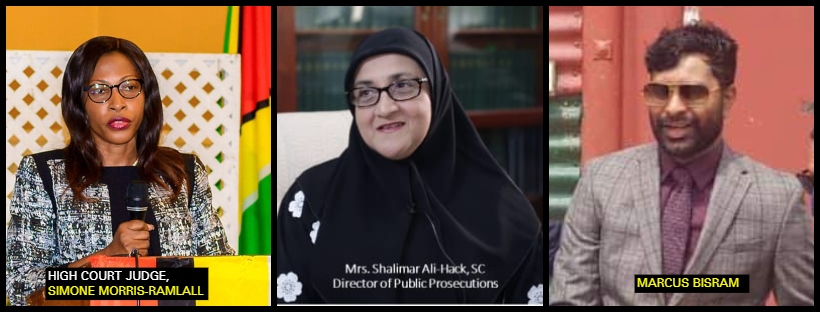The Court of Appeal is set to hear arguments on the application filed by Director of Public Prosecutions (DPP), Senior Counsel Shalimar Ali-Hack against a High Court order freeing Guyana-born U.S.-based businessman, Marcus Bisram for the 2016 murder of Berbice carpenter, Faiyaz Narinedatt is set for December 18, 2020.
Chancellor of the Judiciary Yonette Cummings-Edwards and Justices of Appeal Rishi Persaud and Dawn Gregory held a Case Management Conference (CMC) on Friday.
During today’s hearing, a number of issues were dealt with by the parties involved.
In June last, Justice Morris-Ramlall ruled that the DPP’s directive to Magistrate Renita Singh, who had discharged the charge against Bisram following a Preliminary Inquiry (PI), was unlawful. The Judge had also ordered that Bisram be immediately released from jail, where he had been on remand pending trial.
In her 32-page judgment, Justice Morris-Ramlall noted that the evidence disclosed by the prosecution did not meet the requisite evidentiary threshold to support calling upon Bisram to lead a defence at the close of the prosecution’s case. As a matter of fact, the Judge held that no prima facie case had been made out against him to put him on trial by a jury before a judge.
“…The evidence is insufficient, or, in other words, it is not of the quality that a reasonable jury properly directed could safely convict on it. The state or extent of the evidence is a relevant factor that should have been taken into account by the DPP in arriving at her decisions,” Justice Morris-Ramlall underscored in her judgment.
Taking this into consideration, Justice Morris-Ramlall further held that the DPP did not lawfully exercise her discretion under Section 72 of the Criminal Law Offences Act, Chapter 10: 01, for Bisram to be committed, and that the committal by the Magistrate cannot stand.
Hence, the Judge issued an order quashing the DPP’s directive for Bisram’s committal; an order that the arrest of Bisram on March 30, 2020, was unlawful; an order that the continued incarceration of Bisram since his arrest on March 30, 2020, is unlawful; another order compelling the DPP, Attorney General and Commissioner of Police to release Bisram from custody forthwith; and a next order preventing the DPP from bringing a murder charge against Bisram in the High Court.
Bisram’s PI commenced on January 20, 2020, and concluded on March 30, 2020, before Magistrate Renita Singh at the Whim Magistrate’s Court. At the close of the prosecution’s case, the Magistrate discharged Bisram on the ground that a prima facie case had not been established against him.
The purpose of a PI is to determine whether there is a sufficient case or evidence or grounds to put the defendant on trial by the High Court.
However, on the day of the discharge, the DPP exercised her powers under Section 72 (1) and (2) (ii) (b) of the Criminal Law Offences Act, Chapter 10:01 by requesting that the depositions be sent to her and directing that the PI be reopened with a view to committing Bisram.
In compliance with the directions issued, the Magistrate reopened the PI on April 02, 2020, and called upon Bisram, who had been rearrested on March 30, 2020, to lead a defence.
At the close of the case for the Defence, the Magistrate found that there was insufficient evidence to support the charge and adjourned the matter to April 6, 2020, for further directions from the DPP.
On April 6, 2020, the DPP, pursuant to Section 72 (2) (ii) (b) of the above mentioned Act, directed that Bisram be committed to stand trial in the High Court. This direction was duly complied with on the said date by the Magistrate.













